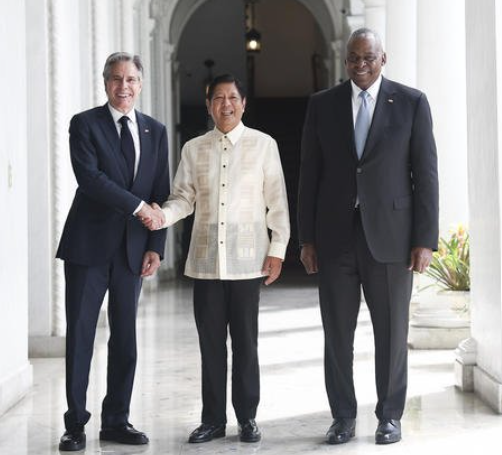Washington Boosts Ties with Philippines, Announces $500 Million Funding Amid Rising China Tensions

U.S. officials in Manila have unveiled a significant $500 million funding boost aimed at enhancing Philippine defenses and advancing a proposed military intelligence-sharing agreement, reflecting growing concerns over China’s assertive actions in the region. This announcement comes as both nations reinforce their alliance amid escalating tensions with China.
U.S. Secretary of State Antony Blinken and Defense Secretary Lloyd Austin met with President Ferdinand Marcos Jr. to solidify the decades-old treaty alliance between the two countries. The meeting emphasized Manila’s ongoing efforts to bolster its defense amid heightened hostilities in the South China Sea.
President Marcos praised the “very open” communication between Washington and Manila, highlighting the importance of their treaty alliance and their ongoing evaluation of key regional issues, particularly in the South China Sea and Indo-Pacific region.
In a joint news conference, Blinken and Austin detailed the $500 million funding package designed to modernize the Philippine military and coast guard. This financial support aims to enhance security collaboration between the two nations, addressing shared concerns about China’s aggressive actions in the South China Sea, East China Sea, and beyond.
Blinken reiterated the U.S. commitment to defend the Philippines if its forces face attacks in the Pacific. “Every investment in strengthening Philippine defense capabilities is a step forward in countering any threat, whether from China or elsewhere,” Blinken stated.
The funding includes approximately $125 million for infrastructure improvements at Philippine military bases under the 2014 Enhanced Defense Cooperation Agreement (EDCA). This agreement allows for increased U.S. military presence and support in the Philippines. Philippine Ambassador to the U.S., Jose Manuel Romualdez, indicated that U.S. military funding could potentially double next year, depending on capacity.
Austin also announced progress on the General Security of Military Information Agreement (GSOMIA), a proposed intelligence-sharing pact. The agreement, which could be finalized later this year, is expected to enhance U.S. support with advanced intelligence, weapons systems, and surveillance technology, while ensuring the security of sensitive information.
The recent visit follows a temporary arrangement aimed at deescalating tensions around the Philippine-occupied Second Thomas Shoal, which had previously seen violent confrontations. The U.S., along with allies like Japan and Australia, has welcomed this arrangement as a positive step toward reducing regional tensions.
Despite the temporary nature of the de-escalation, Philippine officials emphasize the ongoing need to strengthen territorial defenses and build new security alliances. Philippine Foreign Secretary Enrique Manalo and Ambassador Romualdez underscored that efforts to counter China’s actions will continue.
In a nod to U.S. political dynamics, Marcos acknowledged the intense political climate in the U.S. ahead of the upcoming presidential elections but expressed confidence in continued support from Washington. Blinken reassured that U.S. commitment to the Philippines remains steadfast regardless of the election outcome, emphasizing that support for the alliance is a long-standing and enduring aspect of U.S. foreign policy.
Under Marcos’s administration, there has been an expansion of U.S. military presence in Philippine bases and an increase in joint military exercises, despite objections from China. Beijing has warned that increased U.S. deployments could destabilize regional peace, while the Philippines asserts its right to safeguard its territorial interests and national security.
